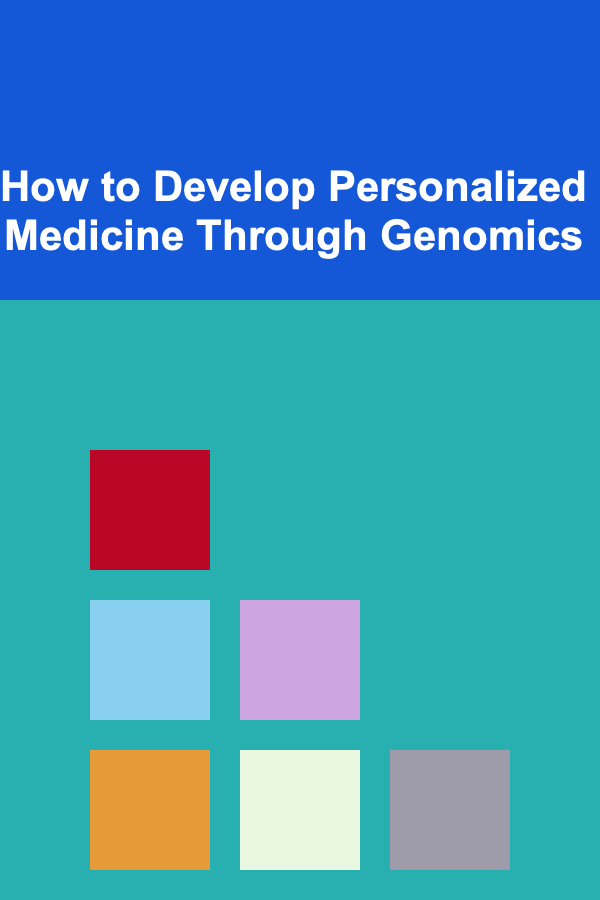
How to Develop Personalized Medicine Through Genomics
ebook include PDF & Audio bundle (Micro Guide)
$12.99$10.99
Limited Time Offer! Order within the next:

Personalized medicine, often referred to as precision medicine, is an evolving field that aims to tailor medical treatments to individual patients based on their unique genetic makeup, lifestyle, and environmental factors. The integration of genomics into medical practice has the potential to revolutionize healthcare by providing more targeted, effective, and safe treatment options. The growing accessibility of genetic information, paired with advancements in genomic technologies, has paved the way for personalized treatments that can improve patient outcomes and reduce adverse drug reactions.
This article explores how genomics can be used to develop personalized medicine, highlighting the role of genetic testing, the importance of genomic data analysis, and the ethical, social, and regulatory considerations that come with the rise of personalized healthcare.
Understanding Genomics and Its Role in Medicine
What is Genomics?
Genomics is the study of an organism's entire genome, which includes all of its genes and the interactions between them. The human genome consists of about 3 billion base pairs of DNA, spread across 23 pairs of chromosomes. Genomics is not limited to sequencing the genetic code but also involves studying the function, structure, and interaction of genes.
In medicine, genomics involves understanding how genetic variations influence the development of diseases, how individuals respond to different treatments, and how genetic factors can predict the likelihood of certain conditions. By examining variations in DNA, genomics allows clinicians to identify the genetic basis of diseases, making it possible to develop more targeted and effective treatments.
Genomics and Personalized Medicine
Personalized medicine aims to provide tailored healthcare solutions based on an individual's genetic profile. The promise of genomics in personalized medicine lies in its ability to shift away from the traditional "one-size-fits-all" approach to treatment, where patients with the same condition receive the same medications and therapies. Instead, genomics offers a model where treatments and prevention strategies can be customized to the genetic and molecular characteristics of each patient.
This approach can be particularly effective in areas such as cancer treatment, where genetic mutations play a central role in the progression of the disease. For instance, targeted therapies have been developed to treat specific genetic mutations in cancer cells, improving patient outcomes and minimizing side effects.
Genomic Technologies Driving Personalized Medicine
Next-Generation Sequencing (NGS)
Next-Generation Sequencing (NGS) is one of the most transformative technologies in genomics. NGS allows researchers and clinicians to sequence DNA and RNA much more efficiently and at a lower cost than traditional sequencing methods. This technology enables the sequencing of entire genomes or specific regions of interest, such as exomes (the protein-coding parts of the genome), with high accuracy and speed.
NGS has made it possible to gather vast amounts of genomic data quickly, paving the way for large-scale genomic studies that are critical for understanding the genetic underpinnings of diseases. In clinical settings, NGS is used for diagnosing genetic disorders, identifying mutations in cancer, and predicting patient responses to drugs.
Genome-Wide Association Studies (GWAS)
Genome-Wide Association Studies (GWAS) are used to identify genetic variants associated with specific diseases. These studies involve scanning the genomes of large populations to find common genetic variations that occur more frequently in individuals with a particular condition. GWAS have provided valuable insights into the genetic factors that contribute to complex diseases such as heart disease, diabetes, and mental health disorders.
GWAS data can be used to inform personalized medicine by identifying genetic markers that predict disease risk, enabling early detection and personalized prevention strategies. Moreover, GWAS can reveal how different individuals might respond to certain medications based on their genetic makeup.
CRISPR and Gene Editing
CRISPR-Cas9 is a revolutionary gene-editing tool that allows scientists to make precise changes to the DNA of living organisms. This technology has opened up new possibilities for treating genetic disorders by directly editing the genes responsible for disease. In personalized medicine, CRISPR could be used to correct genetic mutations in patients' cells, offering potential cures for previously untreatable conditions such as sickle cell anemia and cystic fibrosis.
CRISPR technology also has applications in cancer therapy, where it could be used to modify immune cells to recognize and attack cancer cells more effectively. However, while CRISPR holds great promise, its ethical and safety implications need to be carefully considered before widespread clinical use.
Pharmacogenomics
Pharmacogenomics is the study of how genes influence a person's response to drugs. Genetic variations can affect how individuals metabolize and respond to medications, which can lead to differences in drug efficacy and side effects. By understanding the genetic factors that influence drug responses, pharmacogenomics can help clinicians choose the most appropriate drug and dosage for each patient, improving the chances of treatment success and minimizing adverse effects.
For example, certain genetic variants can affect how a person processes the blood-thinning drug warfarin. By using pharmacogenomic testing, healthcare providers can determine the right dose for each patient based on their genetic profile, reducing the risk of bleeding or clotting complications.
Key Steps in Developing Personalized Medicine Through Genomics
Step 1: Collecting Genetic Data
The first step in developing personalized medicine is to collect genetic data from patients. This can be done through various methods, including blood tests, saliva samples, or tissue biopsies. These samples are then analyzed to identify genetic variations that may be relevant to the patient's condition.
In the case of cancer, for instance, tissue samples from tumors can be analyzed to identify specific mutations driving the cancer's growth. Once the relevant genetic information is collected, it is stored in a database that can be accessed by clinicians for treatment decisions.
Step 2: Analyzing Genetic Data
Once the genetic data is collected, the next step is to analyze it to identify genetic mutations, variants, or alterations that may contribute to disease. This process involves bioinformatics tools and algorithms that can interpret the data and compare it to known genetic variations linked to diseases.
Data analysis can be complex due to the vast amount of information involved. Researchers use machine learning and artificial intelligence (AI) to help analyze genomic data and identify patterns that might not be apparent to human researchers. These technologies are particularly useful in identifying rare genetic variants that may play a role in disease development.
Step 3: Integrating Genomic Data into Clinical Practice
Integrating genomic data into clinical practice is a critical step in personalized medicine. To do this effectively, healthcare providers need to have access to patients' genetic profiles, which should be incorporated into electronic health records (EHRs). By combining genomic data with clinical information such as medical history, lifestyle factors, and environmental exposures, clinicians can develop more personalized treatment plans.
For example, patients with genetic variants that make them resistant to certain drugs can be prescribed alternative medications that are more effective for their specific genetic makeup. This can also be applied in preventive care, where individuals with genetic risk factors for certain diseases can undergo regular screenings or adopt lifestyle changes to reduce their risk.
Step 4: Monitoring and Adjusting Treatments
Personalized medicine is an ongoing process that requires continuous monitoring and adjustments. As patients undergo treatment, clinicians need to monitor their responses to medications and make any necessary adjustments based on their genetic data.
In oncology, for example, patients with specific genetic mutations may respond well to targeted therapies at first, but over time, the cancer may develop resistance to the treatment. In such cases, genomic analysis can identify new mutations, allowing doctors to adjust the treatment plan accordingly.
Ethical, Social, and Regulatory Considerations
Ethical Issues
As with any new technology, the rise of personalized medicine through genomics raises important ethical questions. One major concern is the issue of privacy. Genomic data is highly personal, and there is a risk that it could be misused, either by insurance companies, employers, or other parties who may discriminate based on genetic information.
Another ethical issue is informed consent. Patients must fully understand the implications of genomic testing and the potential risks and benefits before undergoing such tests. Moreover, the ability to edit genes raises questions about the extent to which humans should intervene in genetic material, especially with technologies like CRISPR.
Social Considerations
Personalized medicine has the potential to reduce health disparities by providing more targeted treatments to underserved populations. However, there is also a risk that genomic advancements may exacerbate existing inequalities in healthcare. Access to genomic testing and personalized treatments may be limited in low-income or rural areas, creating a divide between those who can afford cutting-edge treatments and those who cannot.
Additionally, the growing use of genomics in healthcare could lead to the commercialization of genetic data, where companies profit from individuals' genetic information. This could raise concerns about consent, privacy, and data ownership.
Regulatory Issues
The regulation of genomic technologies is another critical consideration. Governments and regulatory bodies must ensure that genomic tests and therapies are safe and effective for widespread use. In many countries, regulatory agencies like the U.S. Food and Drug Administration (FDA) have stringent requirements for the approval of genomic tests and treatments. However, as the field of genomics evolves, there is a need for updated regulations that keep pace with new developments.
The Future of Personalized Medicine
The future of personalized medicine is bright, with genomics at the forefront of medical innovation. Advances in genomic technologies, coupled with artificial intelligence and machine learning, will continue to improve our ability to develop personalized treatments for a wide range of diseases.
However, several challenges remain, including the need for better understanding of the human genome, improvements in data analysis, and addressing ethical and regulatory concerns. As the field progresses, it is essential to ensure that personalized medicine remains accessible, equitable, and ethical for all individuals.
In conclusion, genomics holds the key to the future of personalized medicine, offering the promise of more targeted, effective, and individualized treatments. By continuing to integrate genomic technologies into clinical practice, we can move towards a healthcare system that treats patients as individuals, rather than as a group. The potential benefits are immense, but careful consideration of the ethical, social, and regulatory issues will be crucial in realizing the full potential of genomics in medicine.
Reading More From Our Other Websites
- [Home Lighting 101] How to Use Lighting to Define Different Zones in Open Concept Spaces
- [Horseback Riding Tip 101] Pre-Ride Checklist: Preparing Yourself and Your Horse for a Safe Ride
- [Home Renovating 101] How to Approach Home Renovations and Remodeling for Maximum Value
- [Screen Printing Tip 101] Troubleshooting Common Screen Printing Mistakes on Shirts
- [Biking 101] Bike Computers 101: Understanding the Basics and Advanced Features
- [Home Family Activity 101] How to Set Up a DIY Family Indoor Camping Experience
- [Home Renovating 101] How to Add a Touch of Luxury to Your Renovation on a Budget
- [Home Cleaning 101] How to Properly Clean and Store Your Seasonal Decor
- [Home Cleaning 101] How to Clean a Bathroom: Tips for Tackling Tubs, Toilets, and More
- [Home Family Activity 101] How to Build a Family Lego Village for Creativity and Bonding

How To Deal with Potty Training Challenges
Read More
How to Renovate Your Home with Minimal Disruption
Read More
How to Stage a Home with Minimal Furniture
Read More
How to Use Magazine Holders for Efficient Paper Storage
Read More
Top Affordable Options for Home Security Systems to Protect Your Home
Read More
How to Explore Play-to-Earn (P2E) Crypto Games
Read MoreOther Products

How To Deal with Potty Training Challenges
Read More
How to Renovate Your Home with Minimal Disruption
Read More
How to Stage a Home with Minimal Furniture
Read More
How to Use Magazine Holders for Efficient Paper Storage
Read More
Top Affordable Options for Home Security Systems to Protect Your Home
Read More